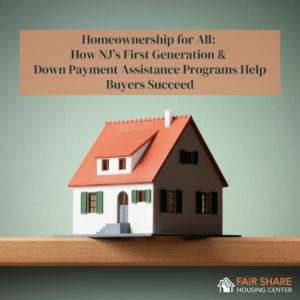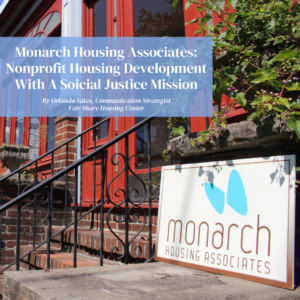The Truth About COAH: A Disingenuous Return to a Broken System Will Leave NJ Residents in a Housing Crisis
November 4th, 2022
By Esmé Devenney
In September, a handful of towns sued Governor Murphy and then testified at an Assembly Housing Committee hearing calling for the return of the Council on Affordable Housing (COAH). Those who want to return to the broken COAH system are making that demand for two reasons: they seek to avoid their constitutional affordable housing obligations and uphold residential segregation.
New Jersey has one of the most robust civil rights frameworks in the country—the Mount Laurel Doctrine—that supports the development of affordable housing in every community. The Doctrine was established through a series of New Jersey Supreme Court cases that constitutionally require all municipalities in the state to provide their fair share of the region’s affordable housing. The Doctrine is critical to preventing exclusionary zoning and tackling segregation in New Jersey.
COAH was established legislatively in 1985 to enforce the Mount Laurel Doctrine. But between 2000 and 2015, COAH did nothing. Affordable housing production in the state essentially stopped, creating a deficit of more than 300,000 homes. In 2015, the New Jersey Supreme Court declared that COAH was essentially inoperative. COAH’s dysfunction — which reached a crescendo when Governor Christie stopped the agency from operating altogether — played a significant role in the housing crisis we’re facing today.
At the Assembly Housing Committee hearing, mayors and others made bold claims about the current Mount Laurel enforcement process. But their testimonies couldn’t be further from the truth.
New Jersey is developing more affordable homes now than ever before, largely due to the enforcement of Mount Laurel. Fair Share Housing Center has settlement agreements with more than 340 municipalities—we estimate that approximately 50,000 affordable homes will be built across the state as a result of these settlements over the next decade. Even the last time COAH was arguably “operating,” it was only able to get 121 towns to compliance.
During the hearing towns claimed that the current enforcement process is costly and confusing, but the process is only costly and confusing to towns who choose to fight it every step of the way. For the dozens of municipalities that chose not to take extreme positions, the process was over rather quickly and they could focus on actually building affordable housing instead of spending millions of dollars trying to keep out low-income families and people of color.
The same holds true for determining a town’s affordable housing obligation. It’s not that complicated—except for those towns who refused to accept the reality of their obligation. In 2015, shortly after COAH was deemed ineffective, a consortium of municipalities hired Dr. Burchell, an affordable housing expert from Rutgers Bloustein, to determine affordable housing needs by town. But Dr. Burchell tragically suffered a stroke, and instead of releasing his report or working with his colleagues to finish it, the municipalities hired a new consultant with little experience on affordable housing. Magically, by hiring someone else, affordable housing needs went down by 75 percent, and over 200 towns had no affordable housing obligation at all. Towns that chose to fight their constitutional obligation understandably found the process more complicated.
Others at the hearing testified for the return of Regional Contribution Agreements (RCA’s). RCA’s allowed municipalities to make a payment, in lieu of constructing affordable housing, that was then used to build affordable housing in a nearby town—most often an urban municipality that already had a disproportionate share of affordable housing. Towns like Alpine, Saddle River, Colts Neck, Wayne, and Washington Township, used RCA’s to send affordable housing to Camden, Newark, and Paterson. RCA’s were ultimately amended out of the Fair Housing Act because they clearly undercut the purpose of Mount Laurel by allowing towns to continue to exclude low-income residents and people of color. RCA’s are a moral failure which former Speaker of the Assembly Joseph J. Roberts, Jr. properly called “blood money.”
RCA’s were also a practical and policy disaster. The state agency responsible for implementation of the agreements lacked oversight and funds often never made it to the intended municipalities or were grotesquely misspent. In Asbury Park, nearly $8 million of RCA funds were misappropriately given to private landowners, landlords, and developers. White, wealthy towns that want to reinstate RCA’s as an “affordable housing bank,” are just looking for another way to keep out low-income families and people of color.
Everyone deserves access to a safe, healthy, and affordable home. Now, more than ever, New Jersey must prioritize the development of affordable housing, and the Mount Laurel Doctrine does just that. Returning to a broken system will only further harm the residents of New Jersey. We can’t afford to go backwards. Instead, we need to build on the success of the current process and implement additional legislative and administrative reforms that end exclusionary zoning, such as using underutilized shopping centers and office parks to sites for mixed-income redevelopment, enforcing inclusionary housing requirements in state-financed developments and using surplus state land to build affordable housing, and continuing to build on recent funding commitments for building affordable homes such as the $305 million Affordable Housing Production Fund.






